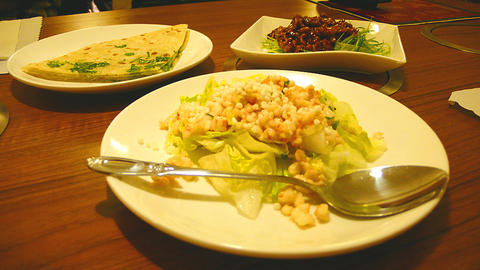Chicken Den (雞窩) is the younger sister of Gi Yuan (驥園), a restaurant well known by gastronomes for its clay pot chicken soup and Sichuan-style cuisine. To keep up with the changing times, the establishment has reinvented itself through the new store, which opened earlier this year, wooing the younger demographic with a chic look, friendly prices and chicken casseroles straight from the mother ship.
The interior exudes a slightly modish charm with its opulent palette: black and crimson chairs, stone floors and ivory and redbrick walls. The compartmentalized dining spaces offer a bit of privacy that models Ethan Ruan (阮經天) and Tiffany Hsu (許瑋甯) seemed to enjoy (the two were spotted dining out on a weekday night by the reviewer).
The menu itself mainly revolves around the clay pot items - costing from NT$500 to NT$2,000 - that come with a choice of two additional dishes. Options range from the less expensive chicken soup to chicken bouillabaisse with shark's fin and abalone. For the ecologically aware, chicken soup with bamboo shoots and pitch are available to replace the shark's fin.

PHOTO: HO YI, TAIPEI TIMES
We ordered the clay pot chicken soup (砂鍋雞湯) set and chicken soup with bamboo shoot (竹笙脆筍雞湯). The dishes were reasonably savory, but as famed recipes that take more than 10 hours to stew, the meal was somewhat disappointing.
Unlike Gi Yuan, which specializes in Sichuan cuisine, the Den fuses cuisine from a variety of regions. Though decently prepared, they are not particularly impressive.
For example, the cumin-flavored lamb chops (孜然羊排) had a strong, piquant flavor, but was very dry. The shredded pork with sweet bean sauce (京醬豬肉) was over-salted and the fried shrimp wrapped in lettuce (生菜蝦鬆) had the shrimp-to-lettuce proportions all wrong.
With an efficient and friendly service from a well-trained crew, Chicken Den provides a decent dining experience that comes with a fat bill.

April 28 to May 4 During the Japanese colonial era, a city’s “first” high school typically served Japanese students, while Taiwanese attended the “second” high school. Only in Taichung was this reversed. That’s because when Taichung First High School opened its doors on May 1, 1915 to serve Taiwanese students who were previously barred from secondary education, it was the only high school in town. Former principal Hideo Azukisawa threatened to quit when the government in 1922 attempted to transfer the “first” designation to a new local high school for Japanese students, leading to this unusual situation. Prior to the Taichung First

Chinese Nationalist Party (KMT) Chairman Eric Chu (朱立倫) hatched a bold plan to charge forward and seize the initiative when he held a protest in front of the Taipei City Prosecutors’ Office. Though risky, because illegal, its success would help tackle at least six problems facing both himself and the KMT. What he did not see coming was Taipei Mayor Chiang Wan-an (將萬安) tripping him up out of the gate. In spite of Chu being the most consequential and successful KMT chairman since the early 2010s — arguably saving the party from financial ruin and restoring its electoral viability —

The Ministry of Education last month proposed a nationwide ban on mobile devices in schools, aiming to curb concerns over student phone addiction. Under the revised regulation, which will take effect in August, teachers and schools will be required to collect mobile devices — including phones, laptops and wearables devices — for safekeeping during school hours, unless they are being used for educational purposes. For Chang Fong-ching (張鳳琴), the ban will have a positive impact. “It’s a good move,” says the professor in the department of

Article 2 of the Additional Articles of the Constitution of the Republic of China (中華民國憲法增修條文) stipulates that upon a vote of no confidence in the premier, the president can dissolve the legislature within 10 days. If the legislature is dissolved, a new legislative election must be held within 60 days, and the legislators’ terms will then be reckoned from that election. Two weeks ago Taipei Mayor Chiang Wan-an (蔣萬安) of the Chinese Nationalist Party (KMT) proposed that the legislature hold a vote of no confidence in the premier and dare the president to dissolve the legislature. The legislature is currently controlled